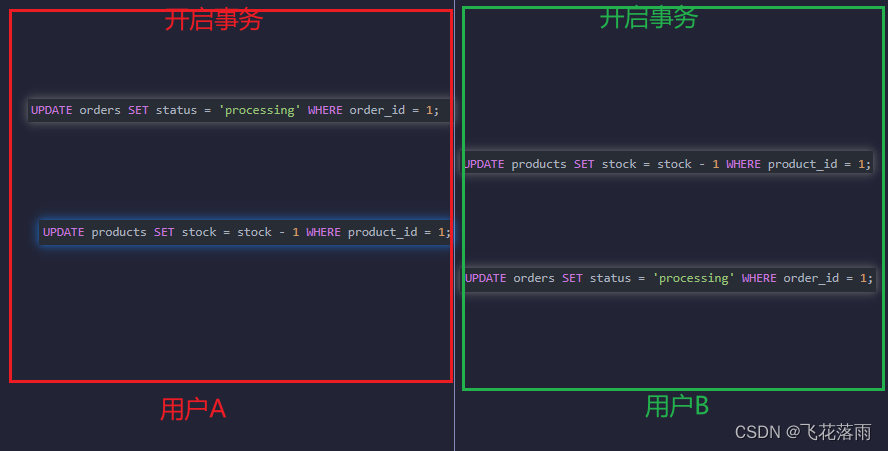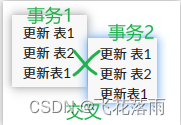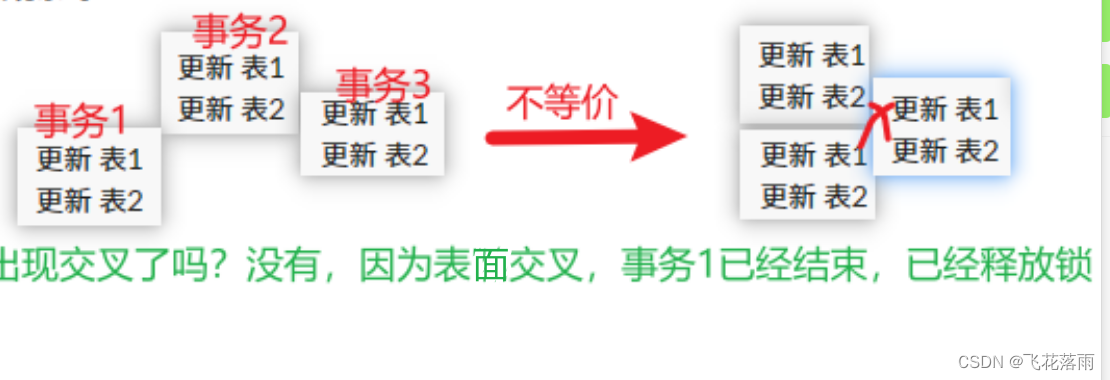SQL死锁
目录
前言:
使用脚本刷数据时,开多线程经常遇到死锁现象,面试也经常问到,故开此篇
日志错误示例:
### Error updating database. Cause: com.mysql.cj.jdbc.exceptions.MySQLTransactionRollbackException: Deadlock found when trying to get lock; try restarting transaction
### The error may exist in com/patpat/product/mapper/SaleProductSkuMapper.java (best guess)
### The error may involve com.patpat.product.mapper.SaleProductSkuMapper.updateById-Inline
### The error occurred while setting parameters
### SQL: UPDATE ps_sale_product_sku_XXXXX_30002 SET sku_id=?, product_id=?, sku_code=?, image=? WHERE id=?
### Cause: com.mysql.cj.jdbc.exceptions.MySQLTransactionRollbackException: Deadlock found when trying to get lock; try restarting transaction
; Deadlock found when trying to get lock; try restarting transaction; nested exception is com.mysql.cj.jdbc.exceptions.MySQLTransactionRollbackException: Deadlock found when trying to get lock; try restarting transaction
at org.springframework.jdbc.support.SQLErrorCodeSQLExceptionTranslator.doTranslate(SQLErrorCodeSQLExceptionTranslator.java:271)
at org.springframework.jdbc.support.AbstractFallbackSQLExceptionTranslator.translate(Abs分析:
死锁产生的原因:
①不可剥夺(只能由占有资源的进程释放)
②循环等待(每个进程在等待其他进程释放,而其他进程也在等待)
③互斥条件 (一个资源只能同时被一个进程使用)
④请求与保持(申请新资源,并还不释放已占有的)
sql死锁
死锁发生的主要原因是这两个事务对表的锁定顺序不一致,先拿到一把锁的事务等待另一把锁,而那一把锁正被另一个事务持有,形成闭环等待。
模拟:
当多个事务同时访问数据库中的数据并且存在竞争条件时,就有可能发生死锁。下面是一个示例,展示了一个可能导致死锁的情况:
假设有两个用户,用户A和用户B,同时执行以下两个事务:
事务1(用户A):
BEGIN TRANSACTION;
UPDATE orders SET status = 'processing' WHERE order_id = 1;
UPDATE products SET stock = stock - 1 WHERE product_id = 1;
COMMIT;
事务2(用户B):
BEGIN TRANSACTION;
UPDATE products SET stock = stock - 1 WHERE product_id = 1;
UPDATE orders SET status = 'processing' WHERE order_id = 1;
COMMIT;
在以上操作中,存在:用户A执行自己的第一条sql,用户B执行自己第一条sql。用户A再准备执行自己的第二条时,却不能执行了,用户B也不能再执行,于是陷入死锁。如下图:

死锁产生!
(注意总结 此处死锁的特点:① 开启了事务②交叉修改(如果按顺序操作是不是就不会死锁了呢?应该是的))
那么,死锁是2个以上的不同表才能出现死锁吗?不一定
如下:
事务1:
updae A set ... where id =1;
updae A set ... where id =2;
..
事务2:
update A set ... where id =2;
update A set ... where id =1;因此可以总结:
①同一个表中:在一个事务中对同一表进行两次或多次操作,并且在多线程的情况下有多个这样的事务,这可能会导致死锁。
②不同表中:两个事务操作表的顺序不同,出现锁表交叉循环,导致死锁。
解决办法: (本质:快速筛选或高效处理、以此减少锁冲突)
①大事务拆成小事务,尽可能缩小事务范围
大事务:将多个操作放在一个事务中执行
优点:这样可以减少事务的提交和回滚次数,提高性能。
缺点:如果事务过大,涉及到的数据量多,会增加事务持有锁的时间,增加死锁的风险。
小事务:将多个操作分成多个小事务,
优点:每个小事务只涉及少量的数据,尽快释放锁资源。这样可以减少事务持有锁的时间,降低死锁的风险
②业务中存在更新前和更新后一模一样的不再执行更新
场景:通过运维拉去mysql日志,查询发现,下面2事务,对表ps_option_value666进行更新操作,查询数据库发现,要更新的数据和想更新的数据,一模一样!
解决方案:在代码层面检查对象内容如果一样,就不更新了!
数据库死锁日志中部分日志:

数据库原有数据:

数据库死锁日志:
2023-06-15 01:35:18 0x2b170f8877002023-06-15 01:35:18 0x2b170f887700
*** (1) TRANSACTION:
TRANSACTION 15159595386, ACTIVE 0 sec starting index read
mysql tables in use 1, locked 1
LOCK WAIT 5 lock struct(s), heap size 1136, 5 row lock(s)
MySQL thread id 506546, OS thread handle 47376231835392, query id 4253348818 172.31.19.109 app_product_0 updating
UPDATE ps_option_value666 SET option_id=6,
value='18-24 Months' WHERE id=1118
*** (1) WAITING FOR THIS LOCK TO BE GRANTED:
RECORD LOCKS space id 1236 page no 10 n bits 0 index PRIMARY of table `product_service`.`ps_option_value666` trx id 15159595386 lock_mode X locks rec but not gap waiting
Record lock, heap no 224 PHYSICAL RECORD: n_fields 11; compact format; info bits 0
0: len=4; bufptr=0x2b231cfcf469; hex= 0000045e; asc ^;;
1: len=6; bufptr=0x2b231cfcf46d; hex= 00000027a645; asc ' E;;
2: len=7; bufptr=0x2b231cfcf473; hex= 940000030237da; asc 7 ;;
3: len=4; bufptr=0x2b231cfcf47a; hex= 00000000; asc ;;
4: len=4; bufptr=0x2b231cfcf47e; hex= 00000006; asc ;;
5: len=12; bufptr=0x2b231cfcf482; hex= 31382d3234204d6f6e746873; asc 18-24 Months;;
6: SQL NULL;
7: len=8; bufptr=0x2b231cfcf48e; hex= 0000000000001840; asc @;;
8: len=4; bufptr=0x2b231cfcf496; hex= 5b061db0; asc [ ;;
9: len=4; bufptr=0x2b231cfcf49a; hex= 5f6df00d; asc _m ;;
10: len=0; bufptr=0x2b231cfcf49e; hex= ; asc ;;
*** (2) TRANSACTION:
TRANSACTION 15159595381, ACTIVE 0 sec starting index read
mysql tables in use 1, locked 1
LOCK WAIT 5 lock struct(s), heap size 1136, 6 row lock(s)
MySQL thread id 506549, OS thread handle 47373393610496, query id 4253348825 172.31.45.125 app_product_0 updating
UPDATE ps_option_value666 SET option_id=6,
value='4-5 Years' WHERE id=1446
*** (2) HOLDS THE LOCK(S):
RECORD LOCKS space id 1236 page no 10 n bits 0 index PRIMARY of table `product_service`.`ps_option_value666` trx id 15159595381 lock_mode X locks rec but not gap
Record lock, heap no 226 PHYSICAL RECORD: n_fields 11; compact format; info bits 0
0: len=4; bufptr=0x2b231cfcf4e0; hex= 00000460; asc `;;
1: len=6; bufptr=0x2b231cfcf4e4; hex= 00000027a645; asc ' E;;
2: len=7; bufptr=0x2b231cfcf4ea; hex= 940000030237f6; asc 7 ;;
3: len=4; bufptr=0x2b231cfcf4f1; hex= 00000000; asc ;;
4: len=4; bufptr=0x2b231cfcf4f5; hex= 00000006; asc ;;
5: len=9; bufptr=0x2b231cfcf4f9; hex= 352d36205965617273; asc 5-6 Years;;
6: SQL NULL;
7: len=8; bufptr=0x2b231cfcf502; hex= 0000000000002440; asc $@;;
8: len=4; bufptr=0x2b231cfcf50a; hex= 5b061dbf; asc [ ;;
9: len=4; bufptr=0x2b231cfcf50e; hex= 5f6df00d; asc _m ;;
10: len=0; bufptr=0x2b231cfcf512; hex= ; asc ;;
[bitmap of 256 bytes in hex: 00 00 00 00 00 00 00 00 00 00 00 00 00 00 00 00 00 00 00 00 00 00 00 00 00 00 00 00 05 00 00 00 00 00 00 00 00 00 00 00 00 00 00 00 00 00 00 00 00 00 00 00 00 00 00 00 00 00 00 00 00 00 00 00 00 00 00 00 00 00 00 00 00 00 00 00 00 00 00 00 00 00 00 00 00 00 00 00 00 00 00 00 00 00 00 00 00 00 00 00 00 00 00 00 00 00 00 00 00 00 00 00 00 00 00 00 00 00 00 00 00 00 00 00 00 00 00 00 00 00 00 00 00 00 00 00 00 00 00 00 00 00 00 00 00 00 00 00 00 00 00 00 00 00 00 00 00 00 00 00 00 00 00 00 00 00 00 00 00 00 00 00 00 00 00 00 00 00 00 00 00 00 00 00 00 00 00 00 00 00 00 00 00 00 00 00 00 00 00 00 00 00 00 00 00 00 00 00 00 00 00 00 00 00 00 00 00 00 00 00 00 00 00 00 00 00 00 00 00 00 00 00 00 00 00 00 00 00 00 00 00 00 00 00 00 00 00 00 00 00 00 00 00 00 00 00 ]
*** (2) WAITING FOR THIS LOCK TO BE GRANTED:
RECORD LOCKS space id 1236 page no 12 n bits 0 index PRIMARY of table `product_service`.`ps_option_value666` trx id 15159595381 lock_mode X locks rec but not gap waiting
Record lock, heap no 66 PHYSICAL RECORD: n_fields 11; compact format; info bits 0
0: len=4; bufptr=0x2b231cf95154; hex= 000005a6; asc ;;
1: len=6; bufptr=0x2b231cf95158; hex= 00000027a645; asc ' E;;
2: len=7; bufptr=0x2b231cf9515e; hex= 940000030a0a02; asc ;;
3: len=4; bufptr=0x2b231cf95165; hex= 00000000; asc ;;
4: len=4; bufptr=0x2b231cf95169; hex= 00000006; asc ;;
5: len=9; bufptr=0x2b231cf9516d; hex= 342d35205965617273; asc 4-5 Years;;
6: SQL NULL;
7: len=8; bufptr=0x2b231cf95176; hex= 0000000000002240; asc "@;;
8: len=4; bufptr=0x2b231cf9517e; hex= 5b061fd6; asc [ ;;
9: len=4; bufptr=0x2b231cf95182; hex= 5f6df00d; asc _m ;;
10: len=0; bufptr=0x2b231cf95186; hex= ; asc ;;
*** WE ROLL BACK TRANSACTION (2)3、 调整表修改的顺序
按照同一顺序获取多个锁,释放锁时反序释放。这可以避免不同事务交叉锁定导致死锁。
场景:项目中有以下3个脚本,分别:
事务1控制的脚本:

出现交叉,且在两个事务中循环。如果业务允许,则

4. 索引不当导致的死锁
为什么建索引能有效避免死锁呢?
1.为了减少事务持有锁的时间,以此来降低死锁的可能性。
2、避免不同事务对相同的数据行进行锁定,从而减少锁竞争与死锁。(如:对username字段创建普通索引,对email字段创建唯一索引)
5、降低并发
如果性能允许,自然是单个线程,相当于单个事务在执行,那肯定没死锁!这个就看代码性能和业务允许不允许了
6、重试机制
如果发生死锁,重试可能就好了哇